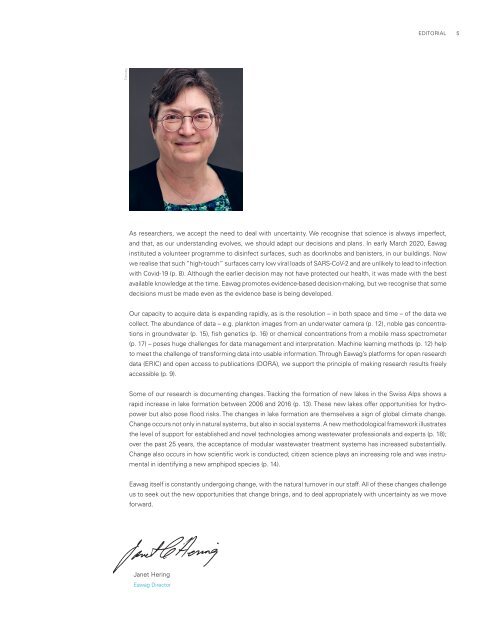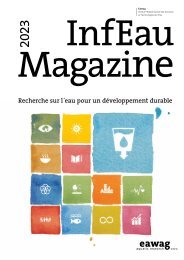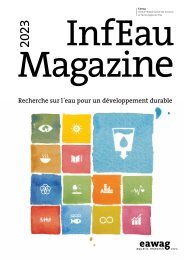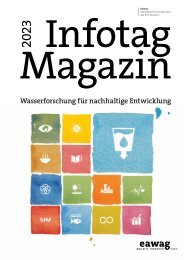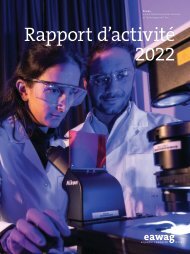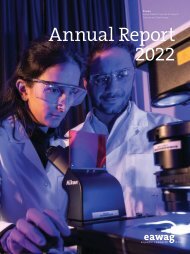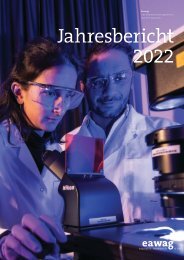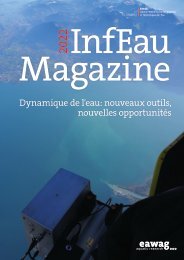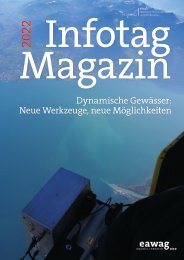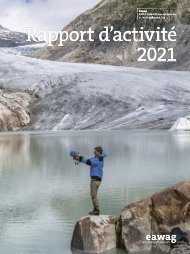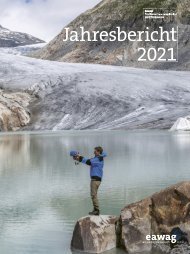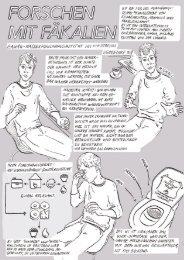Eawag Annual Report 2021
The Annual Report gives a wide-ranging account of current Eawag projects. It is published in English and German, and since 2013 also in French.
The Annual Report gives a wide-ranging account of current Eawag projects. It is published in English and German, and since 2013 also in French.
You also want an ePaper? Increase the reach of your titles
YUMPU automatically turns print PDFs into web optimized ePapers that Google loves.
EDITORIAL<br />
5<br />
<strong>Eawag</strong><br />
As researchers, we accept the need to deal with uncertainty. We recognise that science is always imperfect,<br />
and that, as our understanding evolves, we should adapt our decisions and plans. In early March 2020, <strong>Eawag</strong><br />
instituted a volunteer programme to disinfect surfaces, such as doorknobs and banisters, in our buildings. Now<br />
we realise that such “high-touch” surfaces carry low viral loads of SARS-CoV-2 and are unlikely to lead to infection<br />
with Covid-19 (p. 8). Although the earlier decision may not have protected our health, it was made with the best<br />
available knowledge at the time. <strong>Eawag</strong> promotes evidence-based decision-making, but we recognise that some<br />
decisions must be made even as the evidence base is being developed.<br />
Our capacity to acquire data is expanding rapidly, as is the resolution – in both space and time – of the data we<br />
collect. The abundance of data – e.g. plankton images from an underwater camera (p. 12), noble gas concentrations<br />
in groundwater (p. 15), fish genetics (p. 16) or chemical concentrations from a mobile mass spectrometer<br />
(p. 17) – poses huge challenges for data management and interpretation. Machine learning methods (p. 12) help<br />
to meet the challenge of transforming data into usable information. Through <strong>Eawag</strong>’s platforms for open research<br />
data (ERIC) and open access to publications (DORA), we support the principle of making research results freely<br />
accessible (p. 9).<br />
Some of our research is documenting changes. Tracking the formation of new lakes in the Swiss Alps shows a<br />
rapid increase in lake formation between 2006 and 2016 (p. 13). These new lakes offer opportunities for hydropower<br />
but also pose flood risks. The changes in lake formation are themselves a sign of global climate change.<br />
Change occurs not only in natural systems, but also in social systems. A new methodological framework illustrates<br />
the level of support for established and novel technologies among wastewater professionals and experts (p. 18);<br />
over the past 25 years, the acceptance of modular wastewater treatment systems has increased substantially.<br />
Change also occurs in how scientific work is conducted; citizen science plays an increasing role and was instrumental<br />
in identifying a new amphipod species (p. 14).<br />
<strong>Eawag</strong> itself is constantly undergoing change, with the natural turnover in our staff. All of these changes challenge<br />
us to seek out the new opportunities that change brings, and to deal appropriately with uncertainty as we move<br />
forward.<br />
Janet Hering<br />
<strong>Eawag</strong> Director


